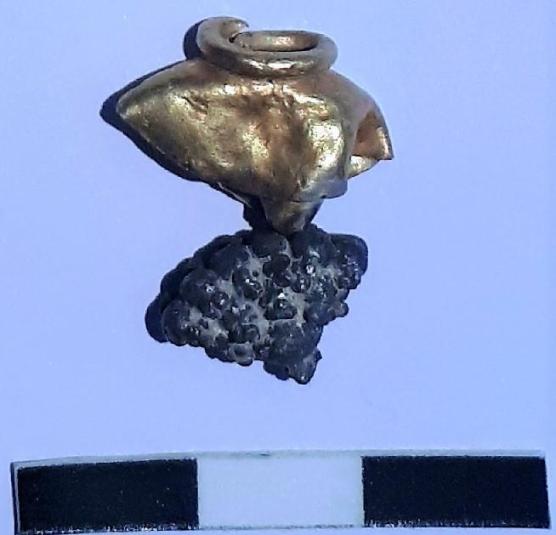One of the most significant events of the Old Testament is the fall of Jerusalem, including the destruction of King Solomon’s temple. The Babylonian siege ended in 586 (or 587) B.C.E. and cost much of the local population their lives or their freedom. Exile in Babylon lasted 50 years, and the entire event is commemorated by the fast of Tisha B’Av, one of the holiest days on the Jewish calendar.
The event has again been verified by a new excavation that found layers of ash, smashed pottery, Babylonian arrows – even an earring left behind in the panic.
Image Credit: Mount Zion Dig
The archaeological site is located on Mount Zion, inside the walls of the old city, and Dr. Shimon Gibson of the University of North Carolina says they’ve likely only scratched the surface of what it holds – and that they’re sure the finds reveal details about the Babylonian conquest.
Image Credit: Dig Mount Zion
“Nobody abandons golden jewelry and nobody has arrowheads in their domestic refuse. It’s the kind of jumble that you would expect to find in a ruined household following a raid or battle. Household objects, lamps, broken bits from pottery which had been overturned and shattered…Frankly, jewelry is a rare find at conflict sites, because this is a rare find at conflict sites, because this is exactly the sort of thing that attackers will loot and later melt down.”
Evidence of the Babylonian conquest, destruction of 1st Temple revealed in Mt Zion dig: arrowheads, ash layer, jewel & Iron Age extensive building. I find these concrete signs chilling of this central event in Jewish history. You? #Archaeology https://t.co/GaoUmWhqz6
— Judith Starkston (@JudithStarkston) August 15, 2019
As they dig deeper, expect more exciting information from the site – they’ve also managed to reveal basements from around the time of the last King Herod, and part of the defenses used to keep out Crusaders in 1099.
The post An Archaeological Dig on MT. Zion Revealed the Babylonian Destruction of Jerusalem appeared first on UberFacts.



 The way we experience music would never be the same
The way we experience music would never be the same  #sonywalkman #40years #sony #walkman #cassetteculture #cassetteigclub #cassettestoreday #cassettecommunity #cassettecollector #tapeheads #tapes #cassettelove #
#sonywalkman #40years #sony #walkman #cassetteculture #cassetteigclub #cassettestoreday #cassettecommunity #cassettecollector #tapeheads #tapes #cassettelove #

 #krugernationalpark . . . . . . #elephant #elephants #krugerpark #kruger #exploresouthafrica #exploreafrica #wild4photosafaris #womenphotographers #canon #canoneos5dmarkiii #canoneos5d #safari #big5 #animalsofkruger #elephantsofkruger #africanelephant #africanelephants #getoutside
#krugernationalpark . . . . . . #elephant #elephants #krugerpark #kruger #exploresouthafrica #exploreafrica #wild4photosafaris #womenphotographers #canon #canoneos5dmarkiii #canoneos5d #safari #big5 #animalsofkruger #elephantsofkruger #africanelephant #africanelephants #getoutside . It’s also the time of year when we have to cover our toes with socks
. It’s also the time of year when we have to cover our toes with socks  DOMAN
DOMAN